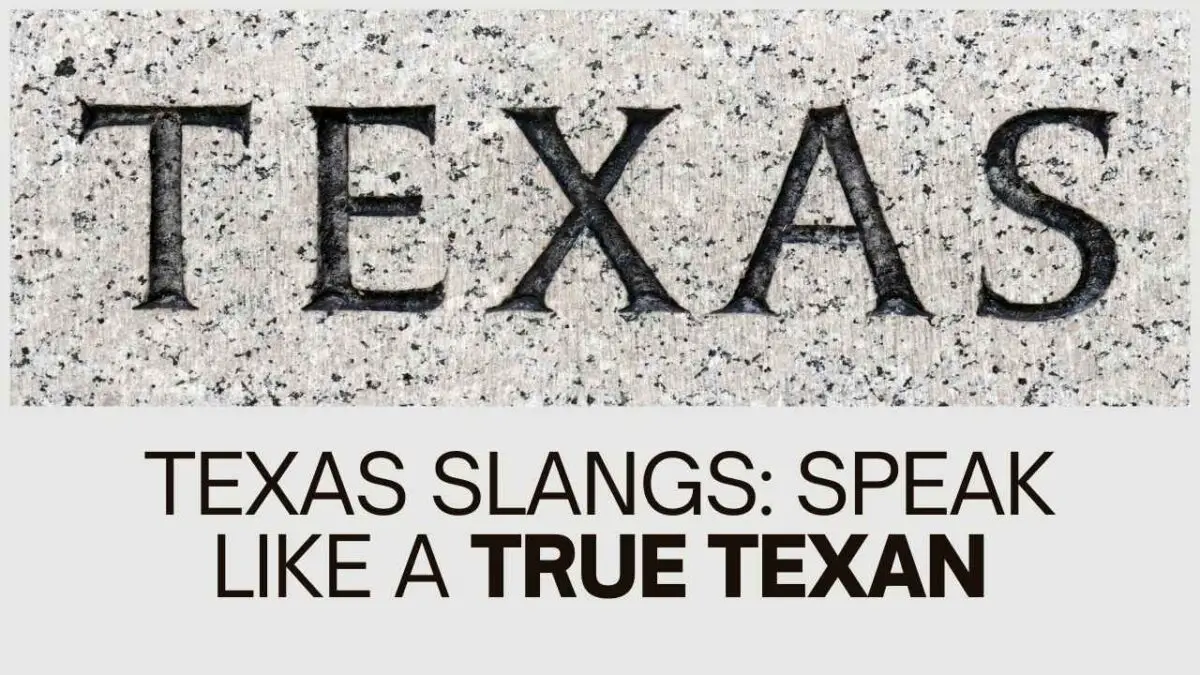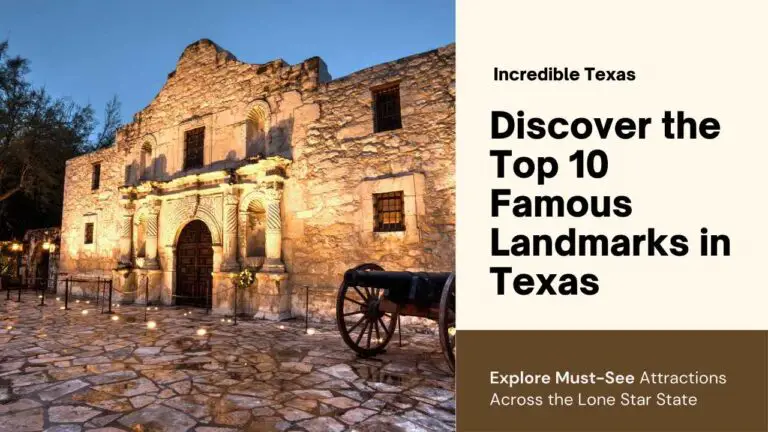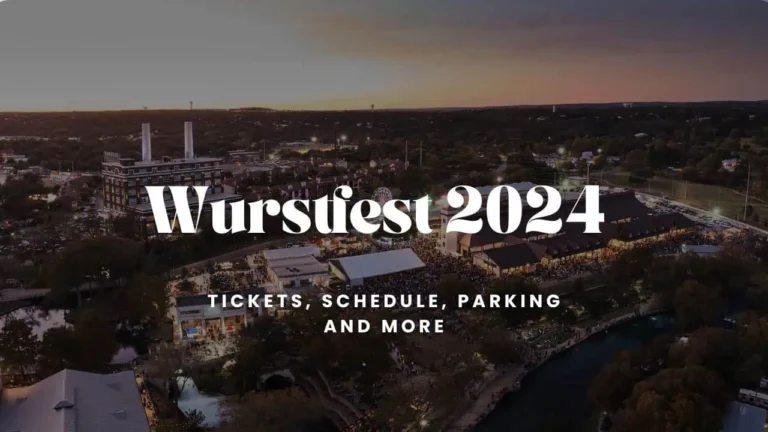Texas Slangs – A Guide to Speaking Like a True Texan
Y’all ready to dive into the colorful world of Texas slang? The Lone Star State isn’t just known for its barbecue, cowboy hats, and rodeos—Texans have a way of speaking that’s as big and bold as the state itself.

Whether you’re visiting Texas or just want to add a little Southern charm to your vocabulary, understanding these unique expressions can make you sound like a local in no time.
In this guide, we’ll explore popular Texas slang, their meanings, and how to use them in everyday conversation. So saddle up, and get ready to speak like a true Texan!
See also: 50 Most Beautiful Places to Visit in Texas: Bucket List
What is Texas Slang?
Texas slang is more than just quirky phrases—it’s a window into the heart of the Lone Star State. Rooted in a blend of Southern, Western, and Mexican influences, Texas lingo reflects the state’s rich history and diverse cultural landscape.
From the twang of the Texan drawl to the unique vocabulary shaped by cowboy culture and Spanish heritage, Texas slang is as distinct as the state itself. Understanding this slang isn’t just about knowing the words; it’s about connecting with the community and embracing a piece of Texas identity.
Whether you’re at a rodeo, a local diner, or just striking up a conversation with a Texan, these expressions capture the warmth, humor, and spirit of Texas life.
See Also – Explore 200 Funny Texas Jokes and Puns for a Good Laugh
Popular Texas Slangs You Need to Know
Here are some of the popular Texas slangs you should know:
- Y’all
“Y’all” is a contraction of “you all,” and it’s one of the most quintessential Texan expressions. Used to address a group of people, it’s a friendly and inclusive way to talk to more than one person, whether it’s your family, friends, or even a crowd at a football game. Texans use “y’all” so naturally that it feels like it’s the only correct way to address a group, adding a touch of southern charm to any conversation. - Fixin’ To
This phrase means “about to” or “getting ready to,” and it’s used all the time in Texas. For example, you might hear someone say, “I’m fixin’ to go to the store.” It’s more than just a phrase—it’s a way of announcing intentions in the most Texan way possible, adding a laid-back feel that perfectly matches the state’s easygoing vibe. - Howdy
“Howdy” isn’t just a greeting; it’s a warm welcome that captures the friendly essence of Texas culture. Unlike a simple “hello,” saying “howdy” feels like opening the door to a conversation as big and inviting as the Texas sky. This greeting dates back to cowboy days and has remained a staple of Texan hospitality. - Bless Your Heart
This phrase is layered with meaning, often used to express sympathy or pity but sometimes with a sarcastic twist. In Texas, “Bless your heart” can be both sincere and a subtle way of pointing out someone’s naivety. It’s a versatile expression, capturing the kind-hearted yet candid nature of Texan communication. - All Hat, No Cattle
A uniquely Texan way to describe someone who talks big but lacks the substance to back it up. This phrase paints a vivid image of a person who looks the part of a cowboy but doesn’t live up to the expectations. It’s a clever way to call out empty bragging while adding a bit of cowboy flair to the critique. - Tump Over
When something tips over or spills in Texas, it doesn’t just fall—it “tumps.” This colloquialism is used across the state, whether you’re talking about a glass of sweet tea or a wheelbarrow of hay. It’s another example of how Texan slang captures everyday actions in colorful and memorable ways. - Mosey
To “mosey” means to walk or move slowly and leisurely, often with no particular hurry. Whether you’re strolling through a ranch or wandering through a small Texas town, “moseying” captures that unhurried, laid-back lifestyle that’s a hallmark of Texas culture.
Texas slang is more than a set of words—it’s a living tradition that reflects the state’s heritage and lifestyle. Embracing these expressions can help you connect more deeply with Texans and appreciate the unique blend of influences that make Texas the vibrant place it is today.
See Also – Texas Mosquito Festival 2024 Guide: Dates, Tickets, and Schedule
Slang by Context: How to Use Them Like a Native Texan
See Also – Mardi Gras Galveston 2024: Schedule, Tickets, and Exciting Challenges
Greetings and Goodbyes
In Texas, greetings are more than just words; they set the tone for a friendly interaction. One of the most iconic Texan greetings is “Howdy,” a casual yet warm way to say hello that instantly makes people feel welcome.
Whether you’re meeting someone for the first time or catching up with a friend, a simple “Howdy” goes a long way in showcasing Texan hospitality. When it’s time to part ways, “See y’all later” is a common farewell that keeps things informal and friendly, perfectly fitting the Texan spirit of openness and connection.
See Also – Explore the Ultimate Guide to Sabine ATV Park: Map, Hours, Events, Camping, and Reviews
Expressing Intentions
Texans often use the phrase “Fixin’ to” when they are about to do something. This expression goes beyond just indicating intent; it reflects the easygoing nature of Texan speech. Whether you’re planning to run an errand or getting ready for an activity, saying “I’m fixin’ to head out” communicates your intentions clearly and with a touch of local charm.
It’s casual, practical, and distinctly Texan, making it a staple in everyday conversations across the state.
See Also – Explore Juneteenth Celebrations in Texas 2023: History, Traditions, and Event Locations
Descriptions and Judgments
“Bless Your Heart” is one of the most versatile expressions in Texas. It can be a sincere way to show sympathy or a subtly humorous way to acknowledge someone’s misstep without being overtly critical.
Context is everything with this phrase; it can soften the blow of a critique or convey genuine concern, depending on the tone. Whether used to comfort someone or gently point out their mistakes, “Bless Your Heart” is deeply woven into the fabric of Texan social interactions.
See Also – Texas Citrus Fiesta 2024 Guide: Dates, Parade Information, History, and Highlights
Daily Actions
Everyday actions in Texas often come with their own unique expressions. The term “Mosey” is a great example, meaning to move slowly or leisurely, embodying the laid-back Texan lifestyle. It’s not about rushing but taking your time, much like a slow stroll through a Texas town.
Another popular term is “Tump Over,” used when something spills or tips over unexpectedly. Whether it’s a drink or an item falling, saying “I tumped it over” captures the casual and vivid way Texans describe daily mishaps.
Using these phrases not only helps you sound like a true Texan but also allows you to engage more authentically with the local culture. Embracing these expressions adds a personal touch to interactions, making conversations more vibrant and connected, just like the people of Texas.
See also: 9 Must-Visit Hidden Gems in East Texas
Texan Sayings and Expressions
Texan expressions are as colorful and varied as the state itself, often reflecting the unique blend of cowboy culture, Southern charm, and the harsh Texas climate.
Phrases like “It’s hotter than a jalapeño’s armpit” are not just humorous—they paint a vivid picture of the extreme heat Texans know all too well. These sayings capture the environment, personality, and wit of the people who call Texas home.
For example, the saying “Come hell or high water” reflects the perseverance and resilience that Texans pride themselves on, while “All hat and no cattle” is used to describe someone who talks big but has little to back it up.
Texans have a knack for using everyday experiences to convey deeper meanings with a touch of humor, often using these expressions to connect and communicate with a distinctive local flavor.
See Also – Most Populous Cities in Texas You Should Know
Texas Slang vs. Other Southern States: What Sets It Apart?
Texas slang stands out even among other Southern states like Louisiana and Alabama due to its unique cultural influences. Unlike the broader Southern drawl, Texas slang incorporates elements from cowboy traditions, ranch life, and Mexican heritage, creating a distinct linguistic blend.
For instance, terms like “mosey” and “tump over” are used in everyday Texas conversation, reflecting the state’s laid-back and often humorous approach to life.
While other Southern states may share some overlapping phrases, Texas has a specific way of bending and blending words that sets it apart.
For example, in Texas, any soft drink is referred to as “Coke,” regardless of the brand, a peculiarity not as commonly seen elsewhere in the South. The influence of Spanish is also stronger in Texas, particularly near the border, where Spanglish expressions are commonly mixed into everyday language.
These differences highlight how deeply Texas slang is rooted in the state’s diverse cultural history, making it a unique and essential aspect of Texan identity.
Whether through humorous descriptions of the weather or expressions that capture the Texan spirit, the language of Texas reflects a rich tapestry of traditions, attitudes, and influences that are uniquely its own.
See Also – Marfa Lights Festival 2024 Guide: Dates, Schedule, and Ticket Information
How Texas Slang Reflects the State’s Identity
Texas slang is more than just colorful language; it reflects the heart and soul of the state’s identity. At its core, Texas lingo embodies values like friendliness, independence, and straightforwardness, which are deeply ingrained in the Texan way of life.
The casual yet confident use of phrases like “Howdy” and “Y’all” creates a welcoming atmosphere that instantly connects people. This language is a bridge that brings Texans together, creating a sense of belonging no matter where you are in the state.
The use of slang also speaks to the Texan spirit of resilience and self-reliance. Sayings such as “Come hell or high water” capture the determination to face challenges head-on, a trait rooted in Texas’s frontier history.
Similarly, expressions like “All hat, no cattle” highlight the importance of authenticity over pretense, reflecting a culture that values actions more than words. The blend of Southern charm, cowboy culture, and influences from Mexican heritage creates a unique dialect that is as diverse and vibrant as Texas itself.
See Also – Wurstfest 2024 Guide: Tickets, Schedule, Parking, and More in New Braunfels, TX
Tips for Speaking Like a True Texan
To truly speak like a Texan, it’s not just about learning the words—it’s about adopting the attitude and rhythm that comes with them.
Start by incorporating classic Texan phrases into your daily conversations, like greeting people with “Howdy” instead of “Hello” or using “Fixin’ to” when you’re about to do something. These small changes instantly make your speech feel more authentic and relatable.
Embrace the relaxed pace of Texan speech, characterized by a slower, drawling cadence. Don’t rush your words; instead, savor them, much like the laid-back Texan lifestyle.
Practicing common phrases aloud, like “Bless your heart,” can help you get comfortable with the nuances of tone that often carry multiple meanings, from sincere sympathy to gentle sarcasm.
Another great tip is to immerse yourself in Texan culture. Watch local shows, listen to country music, and, if possible, spend time in Texas to hear the accent in its natural setting.
The more you expose yourself to the sounds and phrases of Texas, the easier it will be to pick up the linguistic quirks that make the dialect so distinct. And remember, confidence is key—Texan slang is as much about the delivery as it is about the words themselves.
See also: 15 Must-Visit Waterfalls in Texas
Common Misunderstandings and Misuses
Texas slang can be a bit of a puzzle for newcomers, and even the most well-meaning non-Texans often stumble when trying to use these expressions. One common mistake is the misuse of “y’all,” which is meant to address a group of people.
Using “y’all” when talking to a single person can quickly out you into an outsider. For larger groups, Texans might use “all y’all,” which may sound redundant but makes perfect sense in local lingo.
Another frequent misstep is misunderstanding the phrase “Bless your heart.” While it might sound sweet, it often carries a hint of sarcasm, subtly implying that someone is clueless or misguided. Non-Texans might take this phrase at face value, missing the nuanced intent behind it.
Similarly, the phrase “Fixin’ to” doesn’t mean repairing something; it’s all about intent, like saying you’re about to do something. Using it incorrectly can make your speech sound awkward to a Texan ear.
Another common error is thinking “Coke” refers specifically to Coca-Cola. In Texas, “Coke” is used to describe any soft drink, whether it’s Sprite, Dr Pepper, or another brand.
To sound authentic, pay attention to the tone and context of these phrases. When in doubt, listen first, and if you’re unsure, don’t hesitate to ask for clarification.
Most Texans appreciate the effort and will happily help you get it right. Embracing these tips will have you sounding more like a local and less like a tourist in no time
See Also – Explore Fall 2024 Fairs and Festivals Across Texas
Final Thoughts on Texas Slangs
Now that you’ve journeyed through the vibrant world of Texas slang, you’re well on your way to sounding like a native Texan. From classic expressions like “fixin’ to” to uniquely Texan phrases that capture the state’s laid-back, friendly spirit, these sayings are more than just words—they’re a reflection of the culture and character of Texas itself.
So whether you’re gearing up for a trip to the Lone Star State or simply looking to add some Southern flair to your speech, these slangs are sure to help you fit right in.
Remember, in Texas, it’s not just what you say, but how you say it—so don’t be afraid to let your inner Texan shine!
See Also – Best Bait Shops to Visit in Galveston TX





